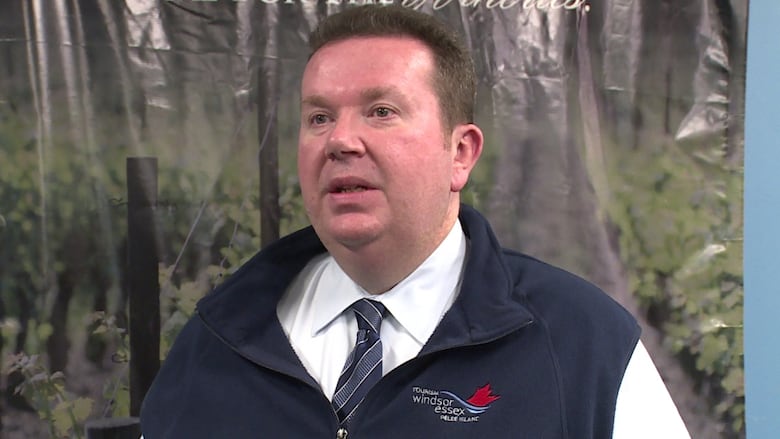Trump tariffs could be 'very detrimental' for Windsor-Essex tourism. But also beneficial?
Local tourism CEO says there's no way to put a bow on pending trade war

Tourism officials in Windsor-Essex are closely monitoring U.S. President Donald Trump's looming tariffs, which they say "could be very detrimental" for an industry that's still recovering from the pandemic.
Gordon Orr, the CEO of Tourism Windsor Essex Pelee Island, said while there are suggestions tourism could be impacted positively, "there's no way to put a bow on this pending trade war."
Speaking on Windsor Morning, Orr recalled that during the COVID-19 pandemic, the tourism and hospitality industry was the first and hardest hit, and the industry also took the longest to recover. But he said things are different this time around.
"With this particular trade war, tourism is not being impacted first. As a matter of fact, we're still playing it out to see how it's going to work — there [are] suggestions that we might get more tourists because of it, coming from the U.S.," Orr said.
LISTEN | Gordon Orr speaks with Chris Ensing about what proposed U.S. tariffs could do to tourism:

"But make no mistake, it's hard to see any silver lining to this because a lot of our industry is still trying to regain from the years of COVID, and at the same time, there's a lot of unknowns.
"Tourism spending is discretionary, so if these tariffs go into effect, that's going to hit everyone's pocketbook and that's when this discretionary spending tourism gets hurt," Orr added.
On Monday Trump dropped his plan to levy tariffs on Canada for at least 30 days after Prime Minister Justin Trudeau made a series of commitments to improve border security.
To get Trump to shelve his punishing tariffs, Trudeau told him Canada is pressing ahead with a previously announced $1.3-billion border security plan that includes reinforcing the 49th parallel with new choppers, technology and personnel and stepping up its co-ordination with American officials to crack down on Trump's stated priorities: illegal drugs and migrants.
U.S. market important to tourism in Windsor-Essex
Pointing to the importance of the U.S. market to Ontario's tourism sector, Orr said it represents about 22 per cent of visitations.
"For Windsor Essex, that's even more — we're at 33 per cent. Our latest statistics are for 2023, we had 5.6 million visitors. Of those 5.6 million visitors, 1.7 million of them were U.S. and 300,000 of those were overnight," Orr said.
"So, we're starting to see … the rebound of overnight visitation and we're starting to see more Americans come over. We're about 9 per cent off of pre-COVID numbers by way of visitation.
"Spending is higher because of course everything costs more, but at the end of the day, tourism and hospitality help support an industry in Windsor-Essex of over 11,000 people. It's a very important industry and we're wondering how this is all going to play out without question," he added.
How tariffs might benefit tourism industry
Joanne Wolnik, executive director of the Southwest Ontario Tourism Corporation, said a trade war between the two countries could benefit local tourism in a number of ways, including if the Canadian dollar sees a decline in value.
"I think of the value of the Canadian dollar and how much further that would go for Americans coming to Canada," Wolnik told CBC News.
"When you look at how much further their dollar would go, I think that they can do a lot more, the value proposition is absolutely there. The U.S. dollar will go a lot further here once they convert it to Canadian dollars."

Wolnik said Canadians are also less likely to go to the U.S. if their dollar wouldn't be going as far.
"I think from that perspective, we'll be losing less travellers to the U.S. and I think we've got more potential to keep them in Canada, specifically across Ontario and Windsor as well," she said.
Wolnik is urging people in the tourism industry to "remain positive" and think about the strengths of their destination.
"Just remember that we are a very safe, welcoming, strong destination for travellers and we should just keep doing what we do best, which is providing really memorable, good high-quality experiences for people to come and enjoy," she said.
With files from Windsor Morning and John Paul Tasker

